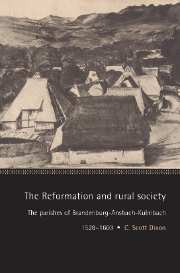Book contents
- Frontmatter
- Contents
- Preface
- Abbreviations
- Introduction
- 1 The emergence and reception of the evangelical movement 1521–1533
- 2 The Lutheran church in Brandenburg-Ansbach-Kulmbach
- 3 The clergyman in context: the extension of the Reformation to the parish
- 4 The Reformation and parish morality
- 5 The acculturation of the parish mind
- Conclusions
- Bibliography
- Index
- CAMBRIDGE STUDIES IN EARLY MODERN HISTORY
4 - The Reformation and parish morality
Published online by Cambridge University Press: 03 October 2009
- Frontmatter
- Contents
- Preface
- Abbreviations
- Introduction
- 1 The emergence and reception of the evangelical movement 1521–1533
- 2 The Lutheran church in Brandenburg-Ansbach-Kulmbach
- 3 The clergyman in context: the extension of the Reformation to the parish
- 4 The Reformation and parish morality
- 5 The acculturation of the parish mind
- Conclusions
- Bibliography
- Index
- CAMBRIDGE STUDIES IN EARLY MODERN HISTORY
Summary
VILLAGE CULTURE AND RELIGIOUS CHANGE
A woodcut of 1540, attributed to Lucas Cranach the Younger, depicts the charred remains of four criminals, each bound to a stake, with the slightly altered text of Romans 13:4 providing a moral for the reader: ‘The sovereign powers are not to be feared by those who do good, but rather by those who do ill. For they do not wield the sword in vain. They are God's servants – against those who do evil, an avenger.’ The juridical complex of sixteenth-century Germany was a brutal system of punishment and discipline, exercised in the public realm. Punishment was theatrical, a ‘theatre of horror,’ and it sent out its message to the subject population: the sovereign powers would exact revenge with violence in equal proportion to the crime; they would not tolerate disorder; they alone had the divine right and exclusive authority to dispense justice. The Reformation did not directly challenge or displace this notion. Indeed, in their need to secure the foundations for their respective faiths, the reformers invested the secular authorities with even greater power. Martin Luther, by limiting the powers of Christ's kingdom to purely spiritual concerns and granting the sword to the temporal realm alone, ‘sanctioned an unparalleled extension of the range of their [secular authorities'] powers’. Although the secular rulers had been extending the range of their powers before Luther offered his theological justification to this trend, the Reformation did grant an unprecedented strength of rule to the early modern state. It is perhaps significant that the four criminals mentioned above met their fate in Wittenberg.
- Type
- Chapter
- Information
- The Reformation and Rural SocietyThe Parishes of Brandenburg-Ansbach-Kulmbach, 1528–1603, pp. 102 - 142Publisher: Cambridge University PressPrint publication year: 1995



